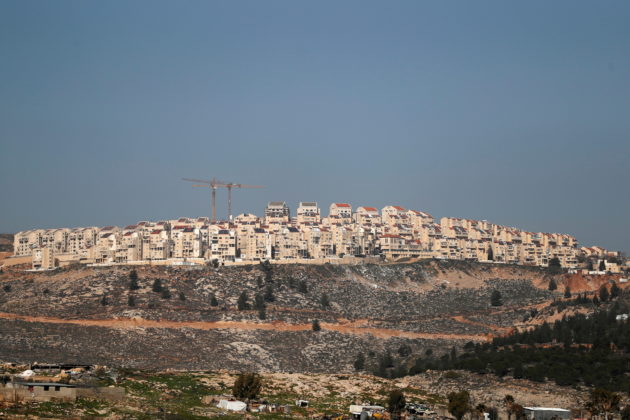By Rami Amichay and Ali Sawafta
SHAAR BINYAMIN, West Bank (Reuters) – Mike Pompeo on Thursday paid the first visit by a U.S. secretary of state to an Israeli settlement in the occupied West Bank, in a parting show of solidarity with Prime Minister Benjamin Netanyahu by the outgoing Trump administration.
Palestinians accused Pompeo of helping Israel to cement its control over West Bank land that they seek for a state after he made a trip to the Shaar Binyamin winery near the settlement of Psagot, just north of Jerusalem.
To Israel’s delight and Palestinian dismay, Pompeo in 2019 broke with decades of American foreign policy to announce that the U.S. under President Donald Trump no longer viewed Israel’s settlements as “inconsistent with international law”.
Palestinians and much of the world regard the settlements as illegal under international law.
After meeting with Netanyahu on Thursday morning Pompeo travelled to the West Bank to visit the settler winery, which has a blend named after him.
He also issued guidelines for Israeli products made in settlements to be labelled “Made in Israel” or “Product of Israel” when imported to the United States, removing the distinction between products made within Israel and those produced in occupied territory.
Pompeo’s visit departed from past policy that had kept top U.S. officials away from settlements, which Palestinians view as obstacles to a viable future state.
Palestinian negotiator Hanan Ashrawi accused Pompeo of using Trump’s final weeks in office “to set yet another illegal precedent, violate international law and perhaps to advance his own future political ambitions”.
“Pompeo is intoxicated by apartheid wine stolen from Palestinian land. It is opportunistic and self-serving, and it damages the chances for peace,” Ashrawi told Reuters.
Wasel Abu Youssef, a senior member of the Palestine Liberation Organization, also denounced his labelling announcement.
“This is totally rejected. It reaffirms the partnership between President Trump and the occupation,” he said.
It is unclear whether Trump’s decision on settlements would be reversed by a Biden administration, amid Israeli concerns he will take a tougher line on the issue.
GOLAN HEIGHTS
Before heading to the West Bank, Pompeo said he also intended to visit the Israeli-occupied Golan Heights.
In 2019 Trump formally recognized Israel’s sovereignty over the area of the strategic plateau that it captured from Syria in 1967 and later annexed in a move not recognized by the United Nations and most countries.
“The simple recognition of this as part of Israel, too, was a decision President Trump made that is historically important and simply a recognition of reality,” Pompeo said on Thursday.
The Palestinian leadership cut ties with Trump White House three years ago, accusing it of pro-Israel bias.
But many Israelis viewed Trump’s election defeat with dismay, and his close ally Netanyahu waited 10 days after Joe Biden declared victory to speak with the Democratic candidate and refer to him as president-elect.
Pompeo said Washington would also step up action against pro-Palestinian efforts to isolate Israel economically and diplomatically.
“I want you to know that we will immediately take steps to identify organizations that engage in hateful BDS (Boycott, Divestment and Sanctions) conduct and withdraw U.S. government support,” he said.
“We will regard the global anti-Israel BDS campaign as anti-Semitic,” Pompeo said. BDS supporters dispute that, saying they are against all forms of racism.
U.S.-based Human Rights Watch said Pompeo had falsely equated peaceful support for boycotts of Israel with antisemitism.
“Instead of combating systemic racism and far-right extremism in the United States, the Trump administration is undermining the common fight against the scourge of antisemitism by equating it with peaceful advocacy of boycotts,” said Eric Goldstein, the group’s acting Middle East and North Africa director.
(Additional reporting by Ali Sawafta in Ramallah; Maayan Lubell, Dan Williams and Jeffrey Heller in Jerusalem; Rami Ayyub in Bethlehem; Nidal al-Mughrabi in Gaza; Editing by Stephen Farrell, Timothy Heritage and Giles Elgood)
 FILE PHOTO: A view shows the Israeli settlement of Psagot in the Israeli-occupied West Bank February 13, 2020. REUTERS/Ammar Awad/File Photo
FILE PHOTO: A view shows the Israeli settlement of Psagot in the Israeli-occupied West Bank February 13, 2020. REUTERS/Ammar Awad/File Photo



